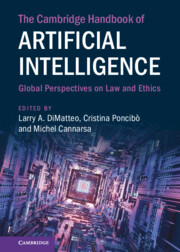Book contents
- The Cambridge Handbook of Artificial Intelligence
- The Cambridge Handbook of Artificial Intelligence
- Copyright page
- Contents
- Figures
- Contributors
- Foreword
- Preface
- Part I AI: Development and Trends
- Part II AI: Contracting and Corporate Law
- Part III AI and Liability
- Part IV AI and Physical Manifestations
- Part V AI and Intellectual Property Law
- 15 Patenting AI
- 16 Patentability of AI
- 17 AI as Inventor
- 18 AI and Copyright Law
- Part VI Ethical Framework for AI
- Part VII Future of AI
17 - AI as Inventor
from Part V - AI and Intellectual Property Law
Published online by Cambridge University Press: 28 July 2022
- The Cambridge Handbook of Artificial Intelligence
- The Cambridge Handbook of Artificial Intelligence
- Copyright page
- Contents
- Figures
- Contributors
- Foreword
- Preface
- Part I AI: Development and Trends
- Part II AI: Contracting and Corporate Law
- Part III AI and Liability
- Part IV AI and Physical Manifestations
- Part V AI and Intellectual Property Law
- 15 Patenting AI
- 16 Patentability of AI
- 17 AI as Inventor
- 18 AI and Copyright Law
- Part VI Ethical Framework for AI
- Part VII Future of AI
Summary
The chapter analyses the impact of AI and IP Law. In August 2019, news reports carried stories about the first patent applications naming an AI algorithm, called DABUS, as an inventor on patent applications. Almost immediately, the United States Patent Office published a request for comments, asking questions about how it should approach AI and patent law. Less than a year later, the questions were seemingly definitively resolved.
Keywords
- Type
- Chapter
- Information
- The Cambridge Handbook of Artificial IntelligenceGlobal Perspectives on Law and Ethics, pp. 240 - 256Publisher: Cambridge University PressPrint publication year: 2022
- 1
- Cited by

